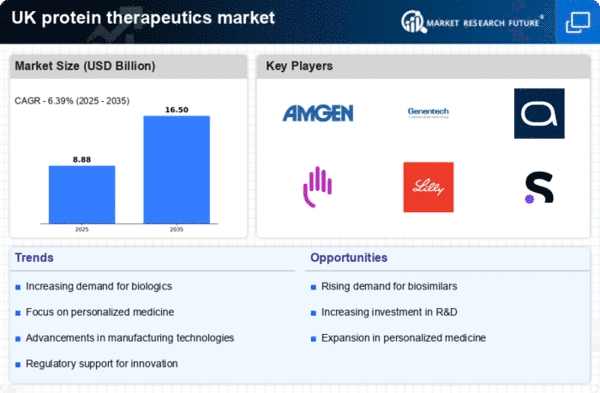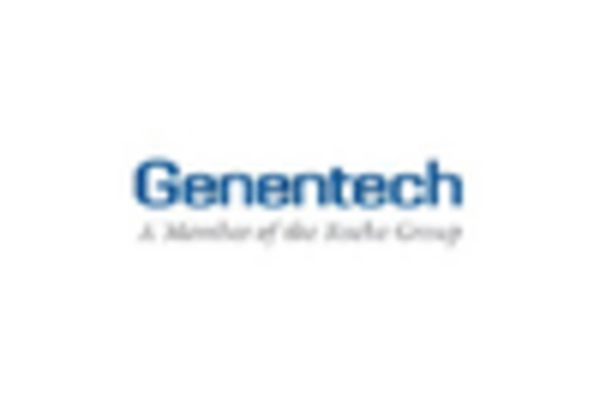Growing Focus on Rare Diseases
The protein therapeutics market is increasingly focusing on the treatment of rare diseases, which often lack effective therapies. In the UK, the prevalence of rare diseases is estimated to affect approximately 1 in 17 individuals, creating a substantial unmet medical need. This has prompted pharmaceutical companies to invest in the development of protein therapeutics specifically targeting these conditions. The UK government has introduced incentives for the development of orphan drugs, which may further stimulate interest in this segment of the market. As awareness of rare diseases grows, The market is likely to see an expansion in product offerings., catering to this niche yet critical area of healthcare.
Increasing Demand for Biologics
The protein therapeutics market is experiencing a notable surge in demand for biologics, driven by their efficacy in treating chronic diseases. In the UK, the biologics segment is projected to account for approximately 30% of the overall pharmaceutical market by 2026. This growth is attributed to the increasing prevalence of conditions such as cancer, autoimmune disorders, and diabetes, which require advanced therapeutic solutions. The shift towards biologics is further supported by healthcare providers and patients seeking more effective treatment options, thereby propelling the protein therapeutics market forward. Additionally, the UK government has been investing in research and development initiatives aimed at enhancing the production and accessibility of biologics, which may further stimulate market growth.
Regulatory Support and Innovation
The protein therapeutics market benefits from a robust regulatory framework in the UK, which encourages innovation and expedites the approval process for new therapies. The Medicines and Healthcare products Regulatory Agency (MHRA) has implemented streamlined pathways for biologics, allowing for faster market entry of novel protein therapeutics. This regulatory support is crucial, as it fosters an environment conducive to research and development, enabling companies to bring innovative solutions to market more efficiently. Furthermore, the UK government has introduced various funding schemes aimed at supporting biotech firms, which may enhance the competitive landscape of the protein therapeutics market. As a result, the market is likely to witness an influx of new products, catering to diverse therapeutic needs.
Rising Investment in Biotechnology
Investment in biotechnology is witnessing a significant increase in the UK, which is positively impacting the protein therapeutics market. Venture capital funding for biotech firms has surged, with estimates indicating a growth of over 40% in the last two years. This influx of capital is enabling companies to invest in research and development, leading to the discovery of novel protein therapeutics. Additionally, collaborations between academic institutions and industry players are fostering innovation, further driving the market. The UK government has also been proactive in supporting biotech initiatives, which may enhance the overall ecosystem for protein therapeutics. As a result, the market is likely to expand, with a diverse range of therapeutic options becoming available.
Technological Advancements in Drug Development
Technological advancements are playing a pivotal role in shaping the protein therapeutics market. Innovations in areas such as gene editing, protein engineering, and high-throughput screening are enhancing the efficiency of drug development processes. In the UK, the integration of artificial intelligence and machine learning in drug discovery is expected to reduce development timelines by up to 30%, thereby accelerating the introduction of new protein therapeutics. These advancements not only improve the likelihood of successful outcomes but also reduce costs associated with drug development. Consequently, the protein therapeutics market is poised for growth as companies leverage these technologies to create more effective and targeted therapies.
















